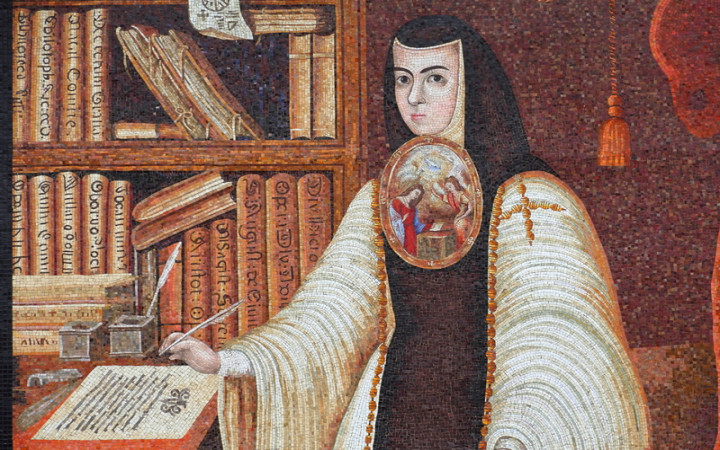Today’s Wonder of the Day was inspired by Wonder Team. Wonder Team Wonders, “Who was Sor Juana?” Thanks for WONDERing with us, Wonder Team!
In Greek mythology, there were said to be nine muses. They represented different areas of art and learning like poetry, history, music, astronomy, and more. You may have heard of the nine Greek Muses, but have you ever heard of the Tenth Muse?
“The Tenth Muse” is a name used for a great poet, Sor Juana Inés de la Cruz, who lived between about 1651 to 1695. This was during Spain’s Golden Age. During this time, Spanish writers and artists were creating great works of art. Sor Juana was one of these great writers. She was born in what is now Mexico, but in the 1600’s, it was part of “New Spain.” New Spain was a part of Spain’s colonies in the Americas that spread from Mexico, down through part of Central America, and up through a large part of what is now the United States.
At that time and in that place, women did not usually go to school. Sor Juana’s mother could not read. With her sister, Sor Juana went to school for a few years, but Sor Juana wanted to learn more. She begged to be allowed to go to university. She even asked to disguise herself as a boy so she could attend! In the end, her family would not allow her to go, but Sor Juana was determined to learn. She used her grandfather’s library to teach herself. Have you ever wanted to learn that much?
Sor Juana learned a great deal from reading. Then she began to write as well. She wrote poetry and plays. Even as a teenager, she wrote so well that the rulers of New Spain heard about her. She came to live at court. While she lived there, she became even more famous for her poetry. She loved learning and writing so much that Sor Juana decided not to marry. Instead, she decided to join a convent and become a nun. She hoped that as a nun, she would be able to continue to write.
In her convent, Sor Juana built a library of about 4,000 books. She also continued to write poetry, plays, and other types of writing. Her work was published, in both New Spain and in Spain. One of her most famous poems was “Hombres necios,” or “Foolish men.” In this poem, Sor Juana talks about some ways that men treated women unfairly. At this time it was very unusual, and could even be dangerous, for women to criticize men. But Sor Juana wasn’t afraid. She believed that women should be allowed to be educated and treated equally to men. In this way, she was one of the first advocates for women’s rights in the New World.
For a time, Sor Juana was both a great writer and a nun. But some in the church were not happy with her success. Finally, though, she was made to give up her books and stop writing. Soon after that, she died.
Now, we remember Sor Juana as one of the greatest poets of her time and one of the first great poets of the New World. Although she lived hundreds of years ago, many still read her poetry and enjoy her works. We also celebrate the fact that she achieved so much as a woman during a time when that was extremely difficult to do. How would you remember her?
Standards: C3.D2.His.2.3-5, C3.D2.His.5.3-5, CCRA.R.1, CCRA.R.2, CCRA.R.6, CCRA.R.10, CCRA.L.1, CCRA.L.2, CCRA.L.3, CCRA.L.4, CCRA.L.5, CCRA.L.6, CCRA.SL1, CCRA.SL.5, CCRA.SL.6, CCRA.W.2, CCRA.W.4




